Can we implement Uniform Civil Code in India? -Explained
Uniform Civil Code or UCC is one of the current debatable topics of our country. So what does the Uniform Civil Code mean? what is the need for uniform civil code in India? What are the advantages and disadvantages of the Uniform Civil Code? Will the Uniform Civil Code Bill (UCCB) ever be a Uniform Civil Code Act (UCCA)?
What is the Uniform Civil Code?
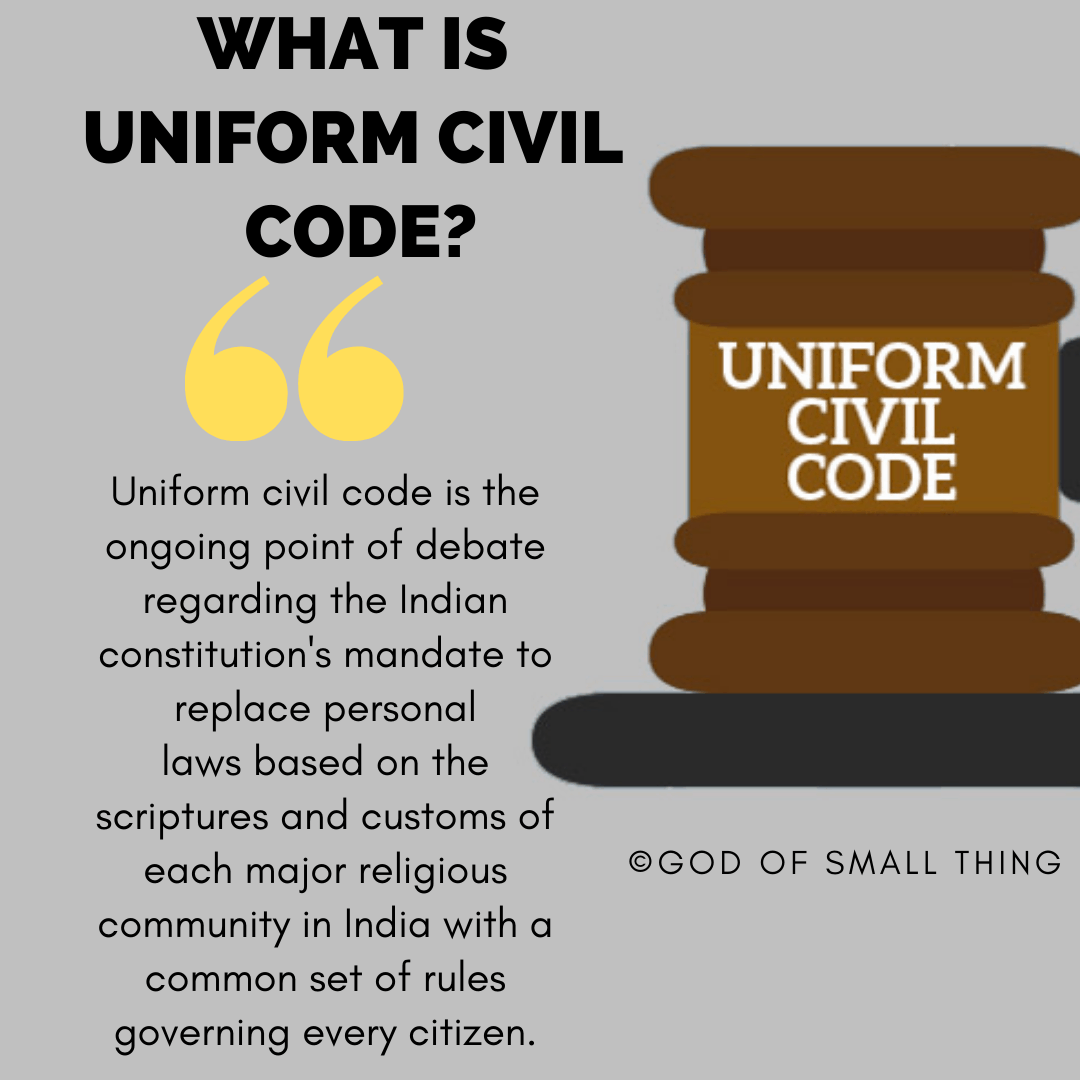
As per Wikipedia, the Uniform civil code is the ongoing point of debate regarding the Indian constitution’s mandate to replace personal laws based on the scriptures and customs of each major religious community in India with a common set of rules governing every citizen. Article 44 in Part IV of the Constitution of India dealing with Directive Principles of State Policy of India expects the state to apply these while formulating policies for the country.
In simple terms, it implies that there should be same or uniform laws for all the citizens of the country irrespective of their caste, creed, religion, color or gender to promote social, economic, and political justice.
Article 44 of the Directive Principles expects every state of the country to implement these rules while formulating policies for the country. This is an important aspect regarding the fundamental right to practice religions which are written down in Article 25. The Uniform civil code is an important issue for secularism in India.
It is interesting to know that Goa is the only place in India where a common family law prevails. We will discuss the Uniform Civil Code pros and cons, and the Uniform Civil Code in Goa in detail in the article further.
Uniform Civil Code History
Going back to history, the Britishers had made uniform laws like the Indian penal code, the Indian Evidence Act, CRPC, and other laws. But then what about the laws that were not interpreted, including the personal laws and the customs followed across ages? In the year 1946, the constituent assembly adopted a Uniform Civil Code that was opposed by minorities in the constitute assembly. It was opposed because of the glooming insecurity among the minorities, who thought that this could deprive their rights.
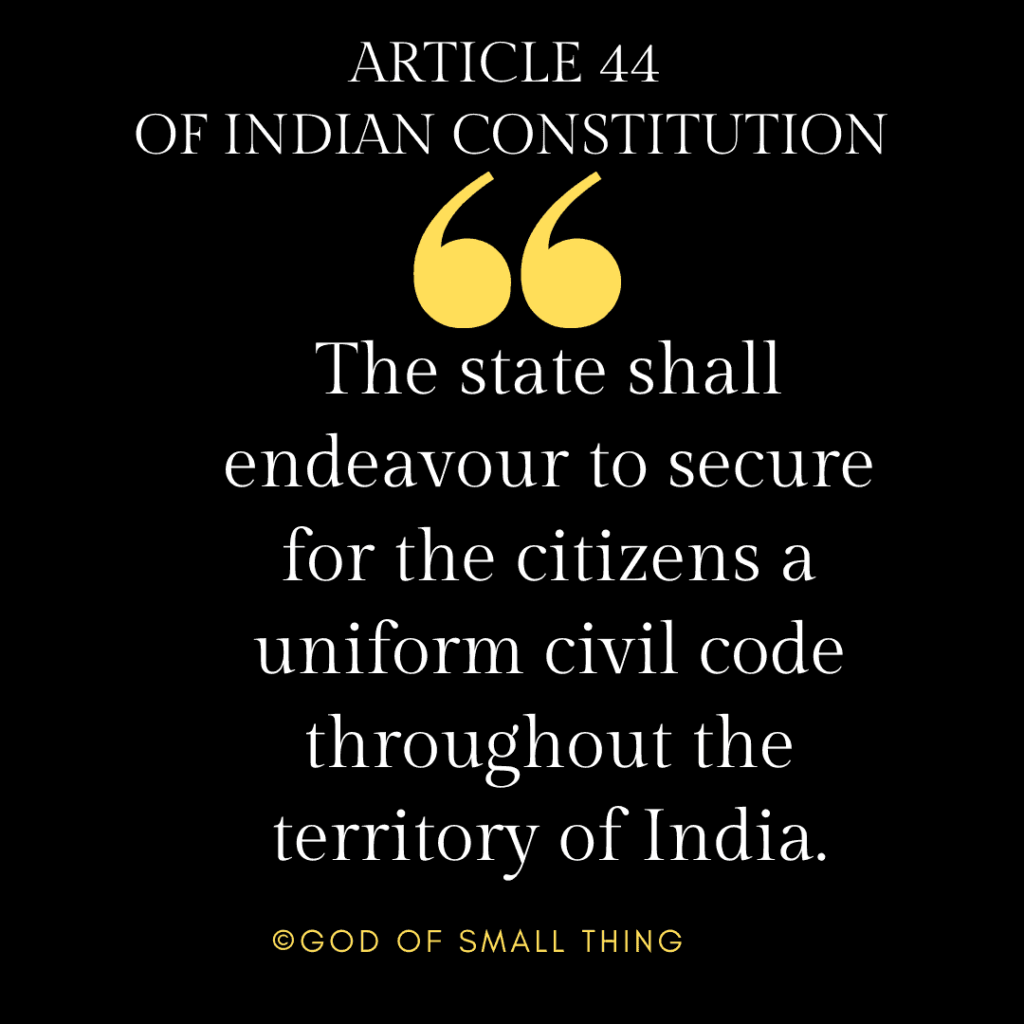
Article 44 affirms that every state shall endeavor to secure for its citizens a Uniform Civil Code throughout the territory of India. On the other hand, there are a series of bills that were passed to codify Hindu laws including the Hindu Marriage Act, the Hindu succession act, the Hindu minority and guardianship act, the Hindu adoption, and the maintenance act. which were known as the Hindu code Bill.
The Hindu code is still being followed instead of a Uniform Civil Code. The UCC deals with the basic principle of secularism. In India, the UCC remains a constitutional dream that is to be fulfilled. In a general sense, citizens think that the Uniform Civil Code is a threat to the religious rights guaranteed by the Constitution under Article 25. But this is not the case establishing a Uniform Civil Code will bring stability in the nation.
By the way, it would be good to hear that Europe has a Uniform Civil Code, the majority or minorities are ruled by the UCC. This makes a country unified and secular. Coming back to the Indian perspective, BR Ambedkar while constituting the UCC said that the only Spears which did not have a uniform law, was the marriage and succession laws whereas, on the other hand, laws related to the transfer of property, negotiable instruments, contracts, easements and sales of goods were uniform in nature and followed by all equally.
The country has been going through a lot of structural changes and there’s no denying that. India is undoubtedly the biggest democracy to ever exist, But is ‘one nation, one election’ a devious plot to quash away the democracy or to save it? What really is at stake here? Explained: One Nation One Election Concept – Big Question to Democracy?
Implementation of the Uniform Civil Code
The implementation and need for a Uniform Civil Code can be understood by various case laws.
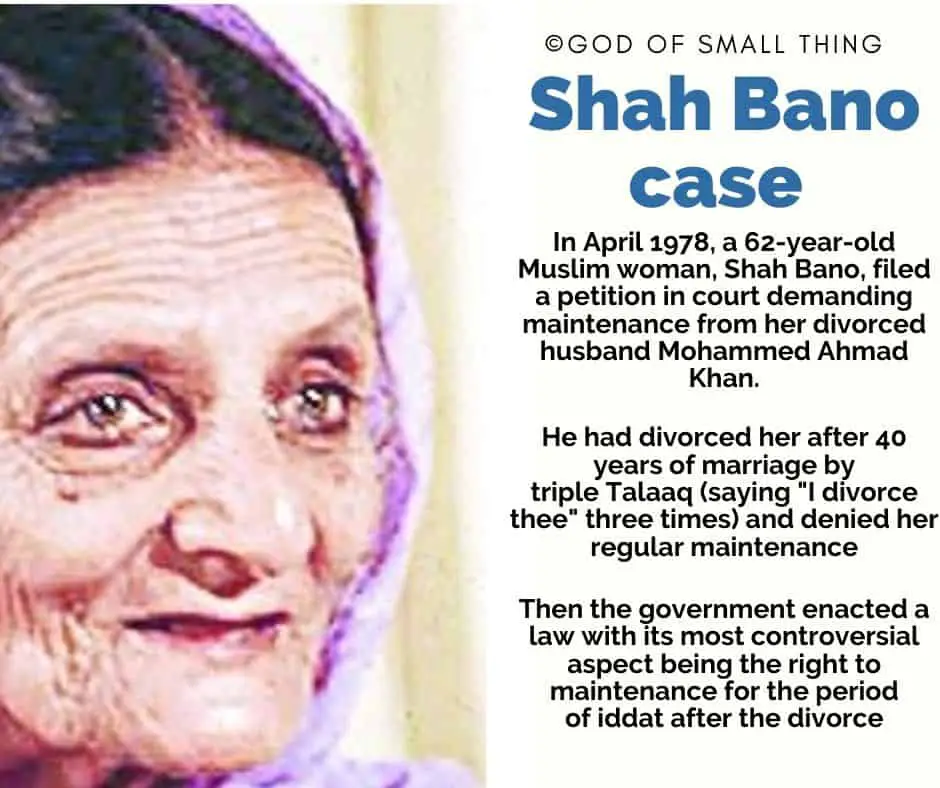
The Indian government has always been a supporter of the Uniform Civil Code as per the case of Mohammed Ahmed Khan V. Shah Bano. That put the UCC issue back into the preface. In this much-praised case, the Supreme Court brought within the cover of section 125 of the Code of Criminal Procedure a divorced Muslim woman. It was ruled that she was entitled to maintenance even after her iddat time had ended. While in several other previous cases, the Supreme Court has played the role of Custodian of the Constitution. The Shah Bano case usurped a seminal place in the history of debates on religion, secularism, and women’s rights.
What is iddat?
The iddat is the waiting time that a Muslim woman has to follow after her husband’s death or divorce, or the end of the marital contract. The woman must stay in the house for a specified time period. She is not allowed to go out and meet men outside of her blood relations until this time ends. The aim is to eliminate all doubt as to the paternity of a child born after the prior husband’s divorce or death.
We may track the challenges that our country’s courts have encountered because of different conflicting personal rules. The Shah Bano case highlighted the importance of the Uniform Civil Code. The UCC was needed to manage the stress of women and remove the ambiguity.
Sarla Mudgal V Union of India
It is the second case in which the Supreme Court in compliance with Article 44 again guided the State. In this case Sarla Mudgal v Union of India, the question was whether a Hindu husband, married under the Hindu constitution, would solemnize second marriage by adopting Islam. The Supreme Court ruled that it was a violation of personal rules to follow Islam for a second marriage. Moreover, Hindu marriage can be broken in compliance with the Hindu Marriage Act of 1955, i.e. merely by converting to Islam and marrying again does not dissolve the marriage.
State of Bombay V. Narasu Appa Mali
Similarly in the case of the state of Bombay V. Narasu Appa Mali, the Bombay Prevention of Hindu Bigamous Marriage Act, 1946 was challenged. It violates Article 14, Article 15 and Article 25 of the Indian constitution. The act prohibited Hindus to practice Bigamy. whereas, Muslims had the full liberty to marry more than one time. This caused discrimination on the part of Hindus. How to remove such ambiguity was the question hence there is a need for the Uniform Civil Code.
Passing the Juvenile Justice (Care and Child Protection) Act was a step pushing India towards UCC. As it opened the way for people from the Muslim Community to adopt children even if it was not allowed by their personal rules. The Indian Supreme Court again called on the Union Government to create a UCC to eradicate gender discrimination and dismantle retrograde practices
The need for the Uniform Civil Code
The importance of a UCC can also be shown through Supreme Court judgments. Especially, when section 125 was made ineffective on Muslim women. In the light of Article 44 of the Indian Constitution, it is often asked that it is not high time that India introduced a uniform civil code. Personal laws are legal laws concerned with problems like marriage, divorce, custody, abortion, succession, etc. rather of being placed on some group or community
Why the Uniform Civil Code is debatable?
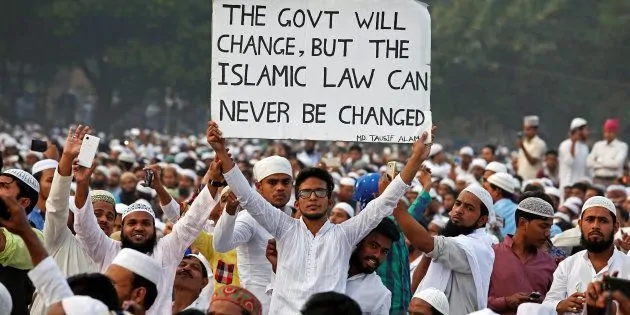
The right to practice religion become a controversial topic in Indian politics during the controversial Shah Bano case of 1985. Article 44 of the constitution is a guideline to the Government to implement UCC for all citizens of the country. DPSP’s were the vision of the Founding Fathers of the Constitution of India to be implemented once we become economically and democratically strong. The biggest challenge is the implementation of the Uniform civil code with hampering the fundamental rights of a person to practice religious functions.
Article 44 of the Constitution is debatable and 3 sided. Some say that the objective of Article 44 is to fight against discrimination. Also, to harmonies different cultural practices in the country. On the other hand, other groups of people say that personal laws are highly important and need to coexist with the Uniform Civil Code.
India is a country with diverse cultures & traditions and all culture and religions have their own set of rules & laws to follow as a result which makes it difficult to manage. Whereas the third class of people says that the Uniform Civil Code is not a good practice and hence personal laws should prevail.
The debate on UCC i.e. Article 44 is mainly to replace individual personal customs and practices of marriage, divorce, adoption, and succession with a common code. the debate goes to violation of the fundamental right to practice religion given under Article 25 of the Constitution. Nowhere there is a dilemma where one needs to practice Article 25 as a fundamental right or Article 44 as Directive Principles of State Policy( DPSP).
The debate Continues
Many times, it is said that the Supreme Court could have decided on this matter in 2017 during the triple talaq judgment (Shayara Bano vs UOI case) where the question was whether personal practices should prevail over the fundamental rights of a person including the right to life guaranteed under Article 21 and equality before law and non-discrimination guaranteed under Article 14 and Article 15 of the Constitution. UCC will always remain a debatable issue in India because of the diversity of people and religions. Most probably, the implementation of Article 44 will be a direct step like Article 377, Article 370, and the Citizenship Amendment Act (CAA).
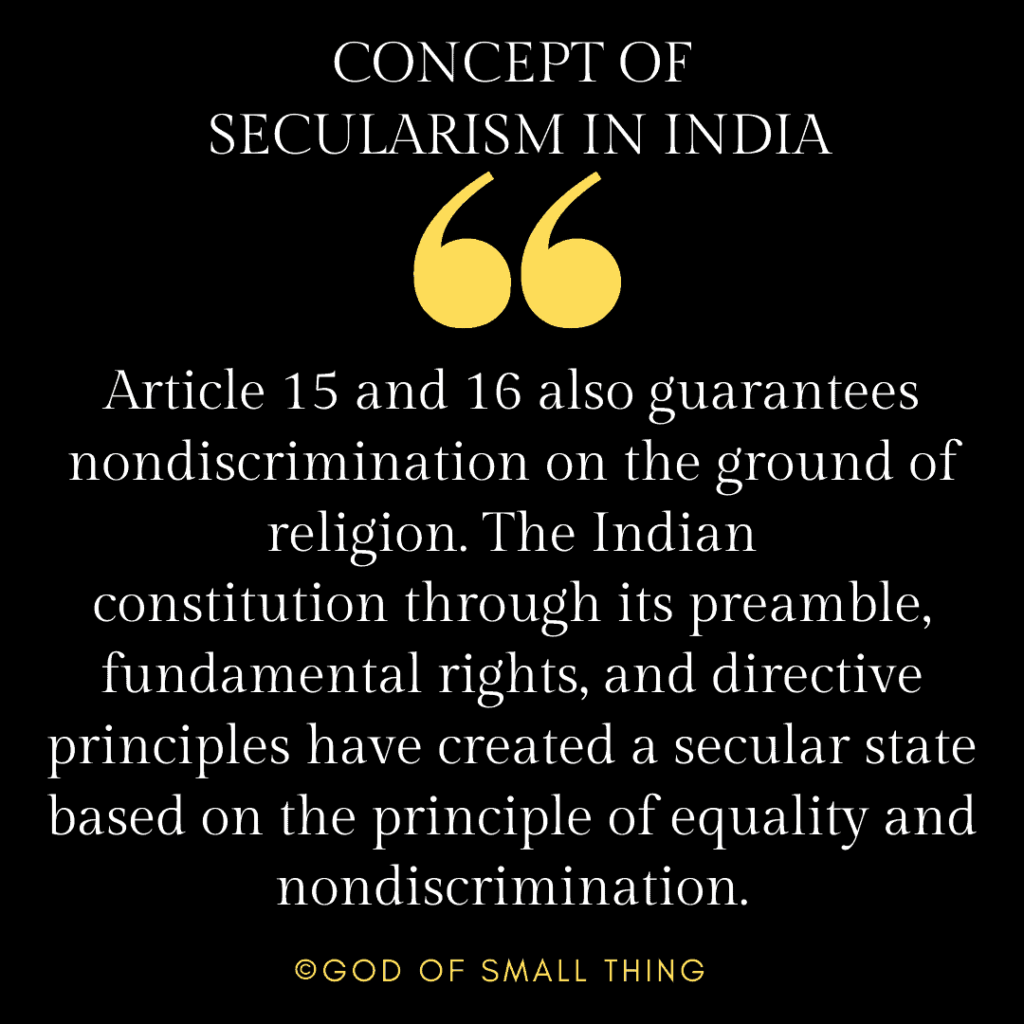
Article 25-28 states freedom of faith, religious practice, holding religious meetings, administrating and building religious institution and propagation of religion. The UCC can’t, however, be forcibly enforced on the citizens because it would then be obviously a breach of Article 25 of the Indian Constitution. UCC and Moral/personal Rules have to coexist. Likewise, UCC is nothing but integrating new and progressive elements into all current personal rules which shouldn’t be ignored.
Do you think the Government has not been doing enough for the poor? Here is a list of Poverty alleviation programs in India- God of Small Thing
Advantages of Uniform Civil Code:
1. Secular Country :
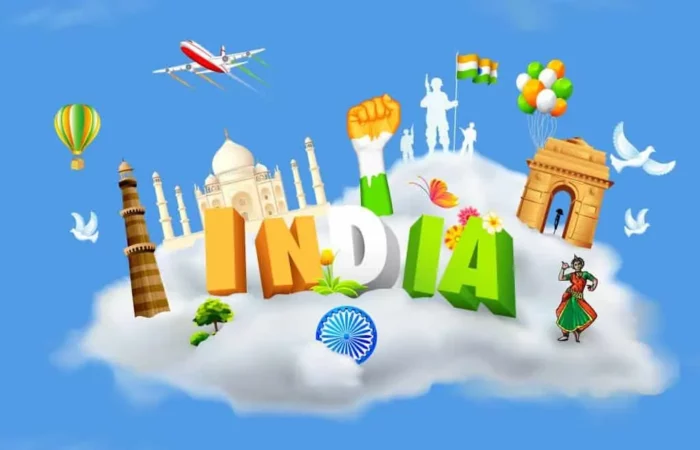
India is a country of diverse culture and is divided into various regions and religions. All of them have their own set of laws governing them. A uniform law enforced over all will prevail the message of equality but might endanger the fraternity of the nation, will strengthen the message of unity and singularity but might also reflect the message of State’s involvement into religion.
Article 25-28 guarantees the right to religion, worship, managing religious institutions, etc but UCC might be interpreted as breach of these fundamental right as the State will be directing the religious laws. ( State- as mentioned in Article 12 of the COI)
2. Equality :
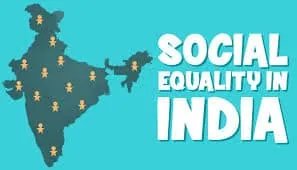
By implementing UCC we can implement many modern laws that couldn’t be forced till now due to various religions and their beliefs. If all the citizens of the country are treated equally and have to follow the same rules then it wouldn’t let politicians use religion as a weapon during elections (which they do) and will eventually reduce ‘Vote Bank Politics’.
3. No personal laws
Article 44 helps in maintaining gender equality in the nation and abolish gender discrimination; for example, there are various laws related to inheritance, marriage, and adoption which are male-dominated. Taking another example in which a Muslim man can marry more than one time. whereas the Hindu cannot. So there should be a common law regulating that the marriage can only be one. It is one of the advantages of UCC.
4. Integration
Bringing a Uniform Civil Code would help to integrate the nation because India has diverse cultural values, customs, and practices. We need a unified law that is irrespective of gender, creed, caste or religion to boost the unity of the nation. this is also an advantage of UCC.
5. Social reforms
The Uniform Civil Code is a social change. In the Indian sense, for example, Muslim women are denied personal laws about marriage, divorce, etc. On the contrary, women from various Muslim nations like Pakistan, Bangladesh, Turkey, and Morocco enjoy codified personal rules. So a codified personal law will also prevail after the implementation of UCC for Indian women especially Muslims and Christians. This would be a stepping stone towards another country-wide social change.
6. Protection of Rights :

Instead of fighting over particular issues like marital separation, child care responsibilities in personal laws, through UCC. The government can ensure gender equality, protection of socially disadvantaged sections, etc. Personal laws made for different religions to follow is nothing but a way for powerful people to suppress the weaker sections of the society. Hence will get reduced.
7. Other Countries :
UCC implied in other countries is a clear sign that it could be of good help in the development of the country.
8. Help women :
Some of the personal laws do not follow gender equality and are discriminatory to women. Uniform Civil Code (UCC) can solve this problem.
Disadvantages of the Uniform Civil Code
1. Risk of Fundamental Rights :
If a certain set of rules or laws are implied on the people that breach their own religious laws. It would be against the Fundamental Right of Freedom from the Constitution of India.
2. History :
The majority of the population of our country loves history because it serves as an exit route for them from dealing with modern problems. Therefore, such people won’t let make modern laws and it would be difficult the implement the UCC.
3. Religion :
It is difficult to make people follow uniform laws as because they’re strong religious believes which makes them believe in only their religious laws. If people are made to follow the uniform laws apart from their religious laws people will stop believing in religion and customs & eventually religion will lose its importance.
4. Diversity :
In a diverse country like India, homogenization may not be suitable and may threaten the continuity of distinct cultures.
At present, the citizenship bill has created chaos in the country where Hindu-Muslim issues have created concerns. So these were the disadvantages of UCC. Hence this is not the right time to implement the UCC. It would just lead to more chaos and fights in the nation.
These were the advantages and disadvantages of the Uniform Civil Code in India.
Uniform Civil Code in Goa
Goa is the only state in India which has a uniform Family law regardless of religion, caste, gender. The law binds all individuals including Hindus, Muslims, Christians, etc. under matters related to diversity, marriage, and succession. Coming on to the technical matters in Goa marriages between two people is termed as a contract. The main purpose is to live together and constitute the legitimate family, Also, getting it registered with the civil registrar. This enables them to start a life.
Goa’s Uniform Civil Code is progressive legislation that provides for equitable division of income and property irrespective of gender between husband and wife and even among children. Any birth, death, and marriage must be registered obligatorily. Extreme conditions refer to divorce. By pronouncing “talaq” thrice, Muslims who have their marriages registered in Goa can not take more than one wife or divorce.
Throughout the marriage, the couple usually retains all the properties and wealth purchased or accumulated by each partner. The partner is entitled to a half share of the property in case of divorce and, if one dies, control of the property is retained by the other. Even if the children have married and left the home
The other half has to be divided evenly among them according to the Uniform Civil Code. The parents cannot then fully disinherit the children, as they can only dispose of half of the property in a will. whereas the remainder has to be divided among others.
Conclusion
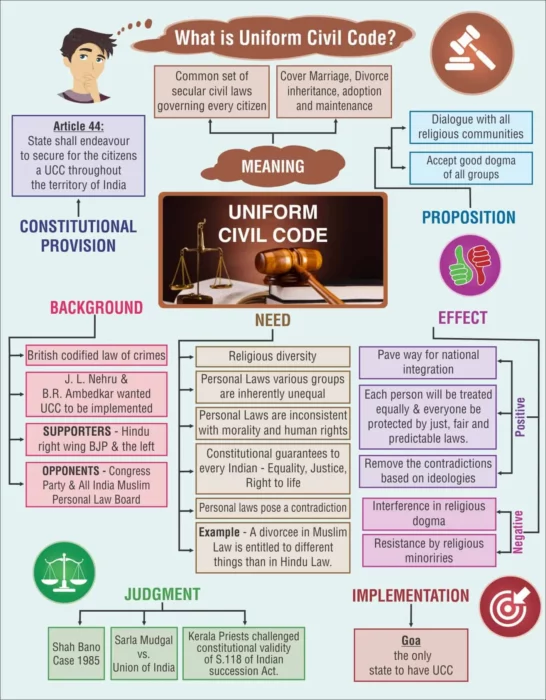
We have discussed the advantages and disadvantages of the Uniform Civil Code in India. Now let’s move on to our conclusion. Can we implement the Uniform Civil Code in India? Although the need for a UCC may appear to be the need of the hour in the wake of the triple talaq ruling by the Hon’ble Supreme Court. It should not be forgotten that in a diverse country like India. Laws where the personal laws deviate even within a religious order, it is next to impossible to enact a uniform law which rights all the wrongs and even more so to convince the people to follow such a law.
The hope in such times can be the enacting of separate laws and legislation for individual religious orders. An example of which is the Hindu Marriage Act, which can truly concentrate on righting the wrongs while maintaining the minority’s belief in the credibility and intents of the government.



Pingback: Indian Army Heroic Battles: The 1971 Battle Of Longewala